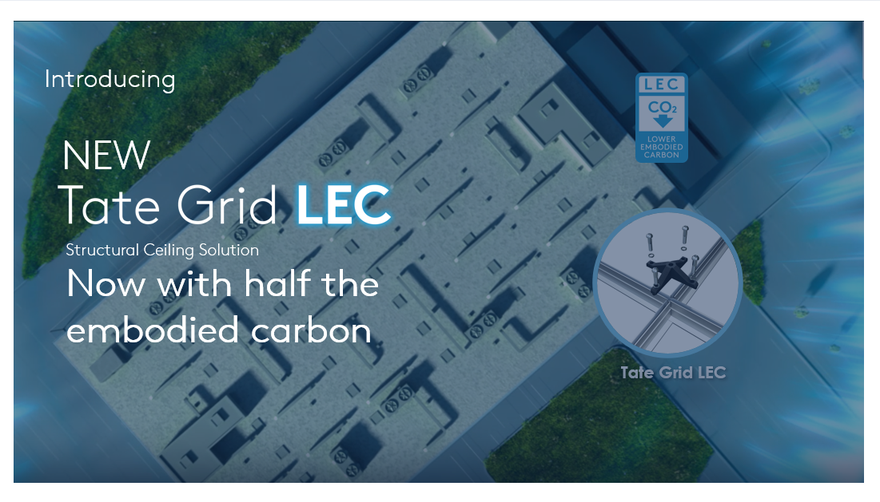At a time when everyone in the industry is laser-focused on meeting sustainability goals, it’s not uncommon for more complex changes to get lost in the weeds of the easy wins. Tate has a different, more holistic approach through its ‘Planet Passionate’ initiative, which covers every facet of a greener world, starting with the often overlooked construction aspect.
Debra Smith, divisional sustainability manager at Tate joined DCD to discuss the company’s new structural ceiling solution Tate Grid with lower embodied carbon (LEC), whilst exploring the company’s ambitious sustainability goals.
“Global Manufacturers such as ourselves, as well as our customers, have to look for effective ways to decarbonize our sectors. This may be challenging, but with a clear roadmap and a willingness to invest time and resources and with engagement with supply chains.” She adds, “Everyone is aware of the climate crisis that is happening today, and companies must act now to mitigate their environmental impacts.”
Attracting like-minded clients
But, we wonder, what is Tate’s method for bringing clients on board with their ethos?
“Engagement is key to developing innovative solutions and overcoming these challenges, engaging with supply chains to allow them to understand our needs and expectations and helping them to innovate to support a lower carbon future, whilst evolving to align with creating social, ethical, and environmental standards is a really good starting point for us,” says Smith.
“We also engage internally with design teams and sustainability teams to ensure we are bringing high performing lower carbon solutions to the market that would support clients' sustainability goals, and then engaging with our customers so that they understand the benefits of these innovative solutions, and how they can accelerate their pathways to net-zero.”
As a company that makes equipment for data centers, largely seen in the construction and upgrade phases of a facility’s lifespan, Tate is acutely aware of the challenges of greener construction. Smith tells us:
“We’re at a critical point now. The construction industry plays a huge role in climate change and the current climate crisis. The built environment represents approximately 39 percent of global energy-related carbon emissions with 11 percent of these emissions coming from the materials used and construction.”
What we need to do about climate change
But Tate is clear about what needs to be done.
“We need to act now and rapidly reduce emissions in both new and existing buildings to address the climate crisis. Reducing the climate impacts of our product range whilst maintaining or enhancing their technical performance is a key priority for Tate. This means quantifying our products' impact via lifecycle assessments and developing a clear plan for decarbonization of these products through incorporating lower carbon materials, such as electric arc furnace steel, or increasing the recycled content, which will drive down the environmental impacts of the product.”
Tate’s first product to be reformulated with sustainability in mind is its structural ceiling solution, Tate Grid LEC. The aluminum used in creating the product is smelted using a lower carbon production process, using renewable energy, much of it hydroelectric. The result is a product that creates half the embodied carbon of its traditional product.
Planet Passionate
This is just one facet of “Planet Passionate”, a ten-year sustainability initiative that looks at every aspect of the company’s activity with a view to an accelerated journey to net zero, as Smith explains:
“Planet Passionate aims to mitigate the company's impacts across the four key categories of energy, carbon, circularity, and water, ultimately reaching net-zero carbon manufacturing by 2030. At our site here we are already operating using more than 99 percent renewable energy.”
She goes on to explain: “Since last year, we have significantly ramped up our procurement of lower carbon materials, such as electric arc furnace steel, and low carbon aluminum to manufacture lower carbon versions of our key product sets. We will soon be able to validate these carbon savings through environmental product declarations, which our customers can then use in the construction of new, more sustainable data centers.”
But energy use is just the beginning.
Water, everywhere
“We have invested in a rainwater harvesting system that reduces our reliance on mains water. We are ISO 14001 certified and demonstrate good environmental management systems. We're working through our on-site efficiencies, but something we are making great strides in is procuring lower carbon materials, such as that which Tate Grid LEC is made of. One of our key group targets is a 50 percent reduction in product CO2 intensity from our primary supply chain by 2030, so by halving the embodied carbon of Tate Grid LEC, we have accelerated our journey towards decarbonization.”
Collecting rainwater may seem trivial compared to other carbon sources produced alongside aluminum, but it illustrates the vital need for businesses to look at every possible aspect of their activity to limit climate change.
Tate has found a way to reduce carbon in its production, and yet, can offer 72-hour shipping of products across Europe. That has involved some adjustments to ensure that speed doesn’t come at the cost of additional emissions. Smith explains:
“We pride ourselves on operating very efficiently. We have strategically placed manufacturing and distribution hubs in mainland Europe to allow us to deliver within this timeframe, as well as local facilities to help us minimize transport emissions. We always use a Euro 6 fleet to reduce carbon emissions coming from transport vehicles, and we have ongoing investigations into how we can switch to things like HVOs, liquid gas, or electric vehicles. We're looking into the feasibility of those options at the minute.”
Whilst Tate Grid LEC is the first product to use this new carbon-reduced technique, the company is committed to rolling out sustainability across its product lines.
“As we get more access to these raw materials, we keep increasing the amount that we procure and are incorporating them into our product range. So we're starting with Tate Grid and are rapidly expanding our LEC product offering. and we'll continue to build on that as we bring out more advanced solutions.”
Bringing the industry with us
Working on Planet Passionate has given Smith a clear insight into the challenges facing data centers on their journey to sustainability. We ask what she would like to see to encourage further engagement with the process. She tells us:
“We know that in the data center industry, there is an energy crisis and access to renewables is an issue. But in terms of what we can control, we're focused on the material side of things and what we manufacture. I would like to see better policies and legislation in place to support more sustainable data center design and enable data center developers to tap into more widely available sources of renewable energy.
Adding, “I would like to see an industry shift to the procurement of these solutions as an essential, rather than just a nice to have. We know because we have completed the life cycle assessments and the Environmental Product Development (EPD) certification. We need more people in the data center world to understand and appreciate the benefits that low-carbon materials can bring to their projects. We want to see an urgency from the industry to find more solutions like ours because the benefit is visible in the overall building envelope.”
Smith goes on to point out the importance of a global push toward renewable energy, but more importantly, ensuring that it is easily available and easily harnessed.
“Each country or region should have sustainability targets at this stage. Here in Ireland, we have committed to halving our greenhouse gas emissions by 2030 and reaching net zero by 2050 at the latest. Nations need to expand their capacity to add green power to their grids by investing in solar, offshore wind, and hydropower among others, and we have targeted regions in our supply chain that have invested in this type of renewable energy so that we're not putting any additional pressure on the already pressurized grid.
“We're really focused on renewable energy. It makes a massive difference to the embodied carbon in our products, so it's in our best interests and our client's best interest to source products from areas and regions that are focused on building the amount of renewable energy that they have.”
Stretch Goals
The company has set itself some lofty goals in its quest to reduce corporate carbon emissions. We finish by asking Smith if the company has always had a green outlook, or if Planet Passionate represented a kickstart in 2020. She explains:
“We have always been proactive when it comes to sustainability and have been evaluating the environmental impact of our products for almost 10 years now. The thinking behind Planet Passionate also started long before 2020. As a member of the Kingspan group, our global business has been on this sustainability journey for quite some time starting with the Net Zero Energy program back in 2011. Our sites started installing solar PV in 2012 and launching take-back recycling schemes in 2011, so it's been ongoing longer than just the last four years. We have always understood the benefits to our products from changes such as better materials, renewable energy, and more recycled content, so we just want to keep building on that and quantifying what that looks like in terms of embodied carbon contribution to our client’s projects.
“We want to be leaders in this space. We see Planet Passionate as an industry-leading strategy, and we want to operate to the expectations of that strategy. Our goals are very ambitious in terms of reaching net zero manufacturing by 2030, but we're quite an ambitious company, it’s what makes our team unique, so we're confident that we will reach all our targets by those dates.”
Visit our website to learn more about Tate Grid LEC
Read the latest Planet Passionate report here
More in The Data Center Construction Channel
-

-

-
Discussion Networking break


